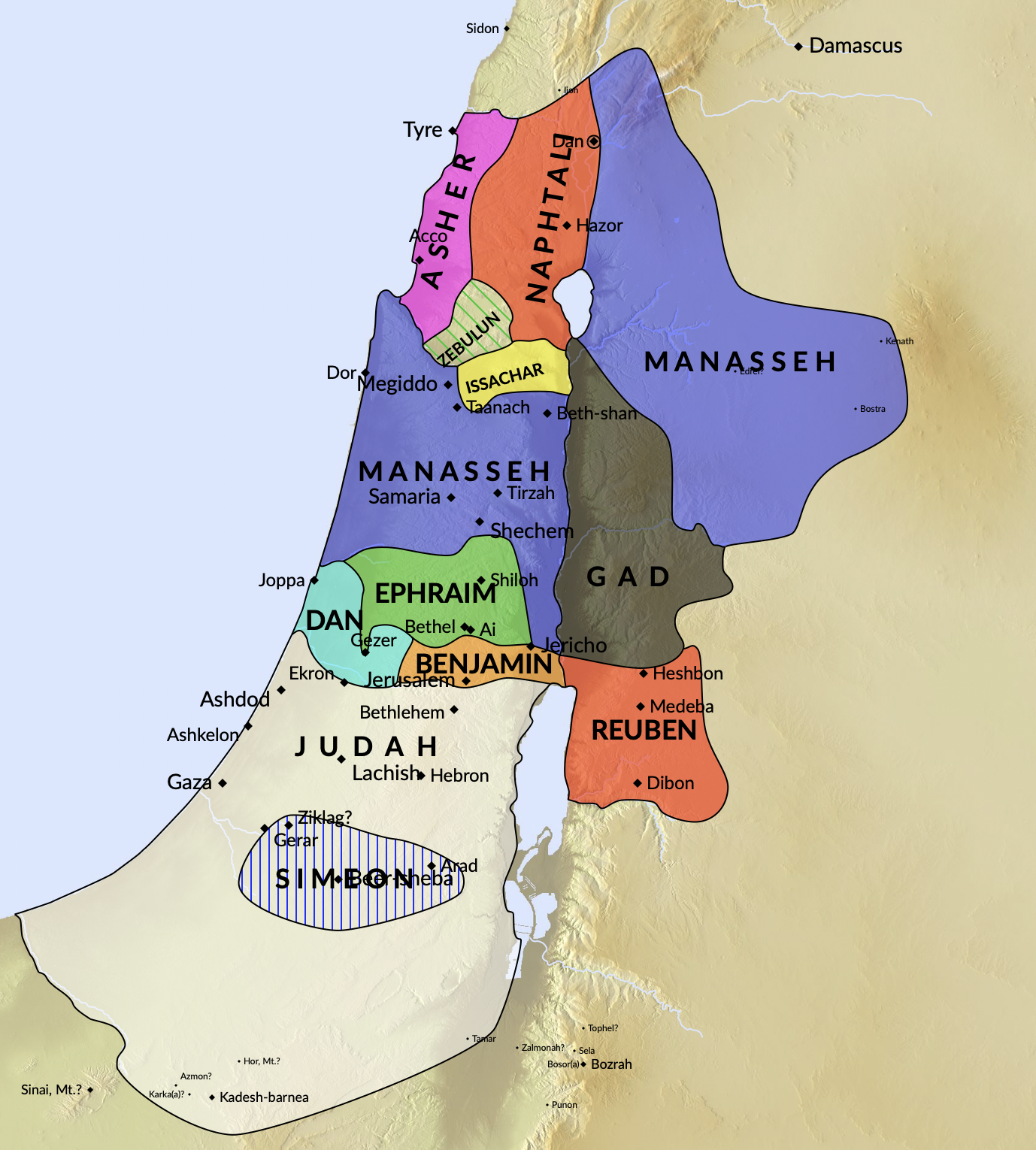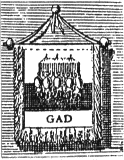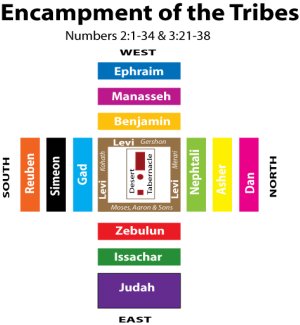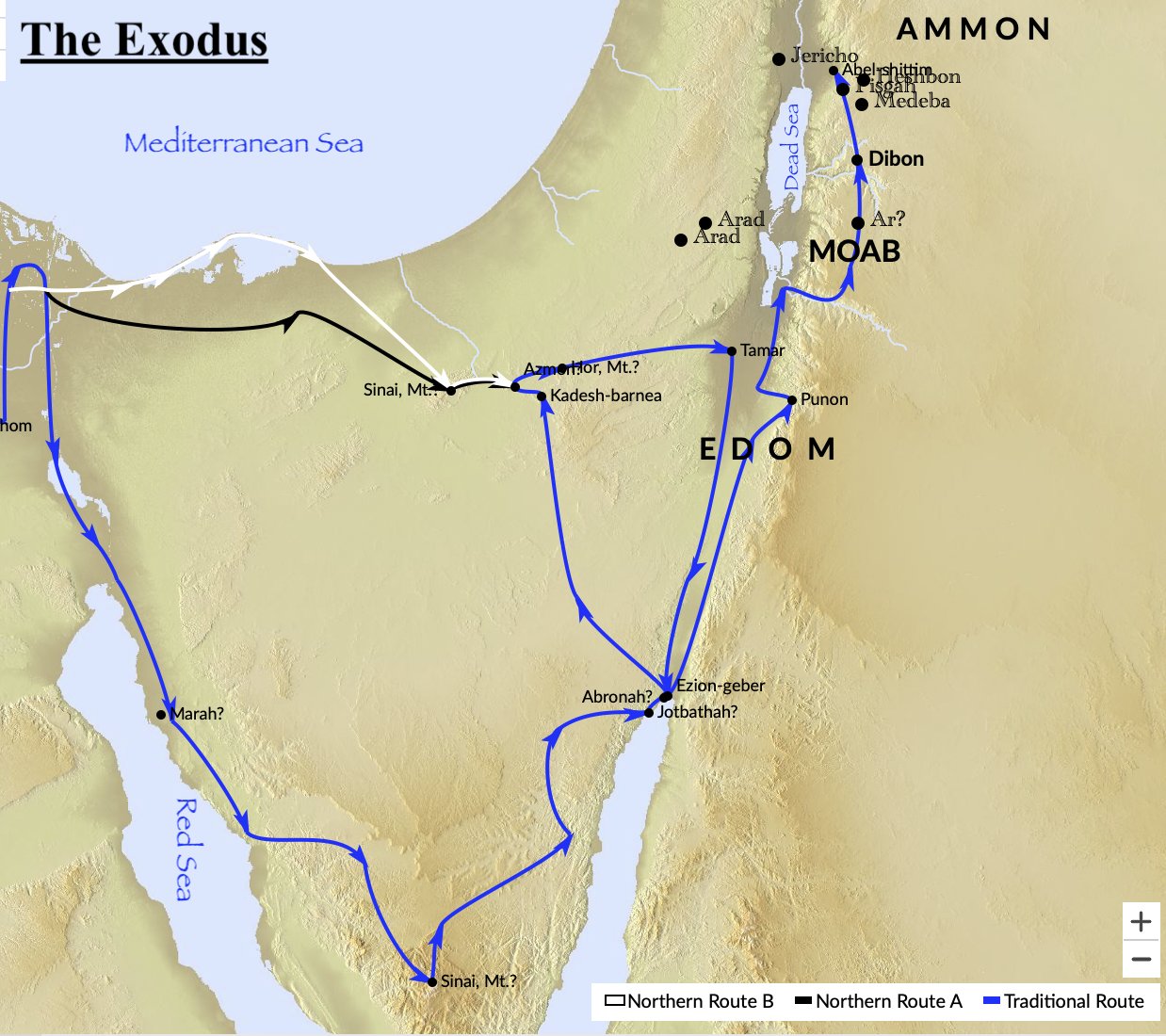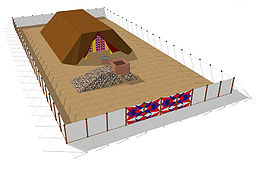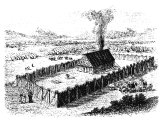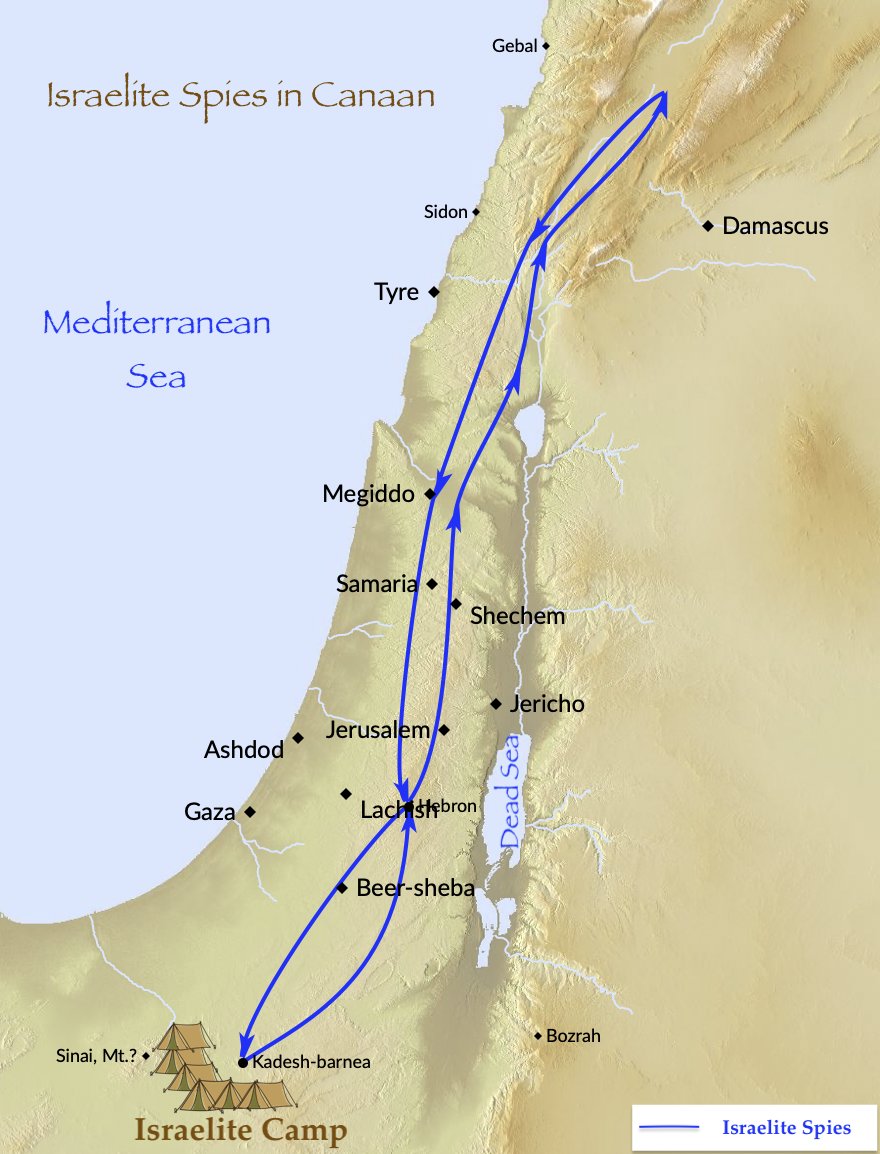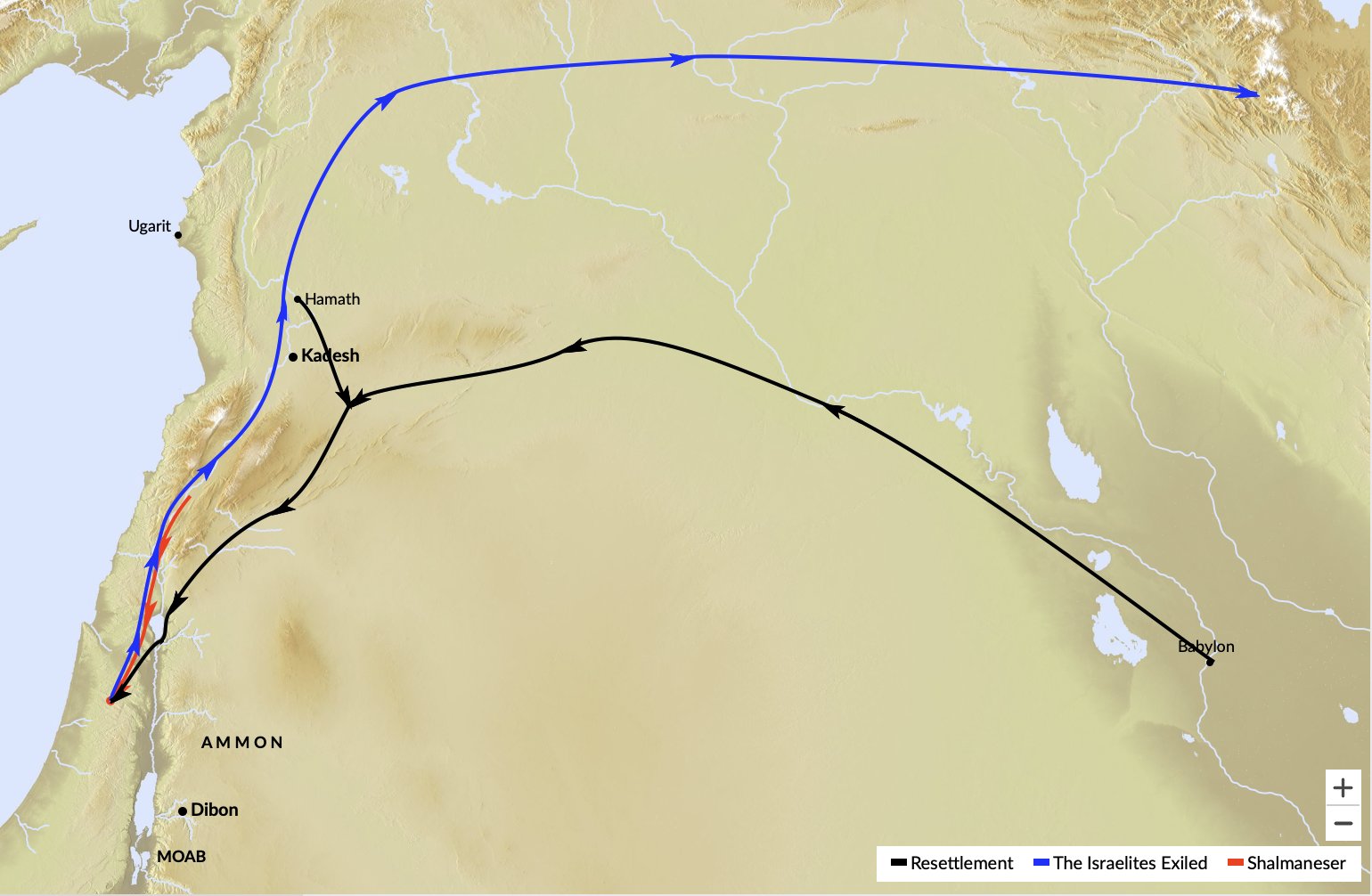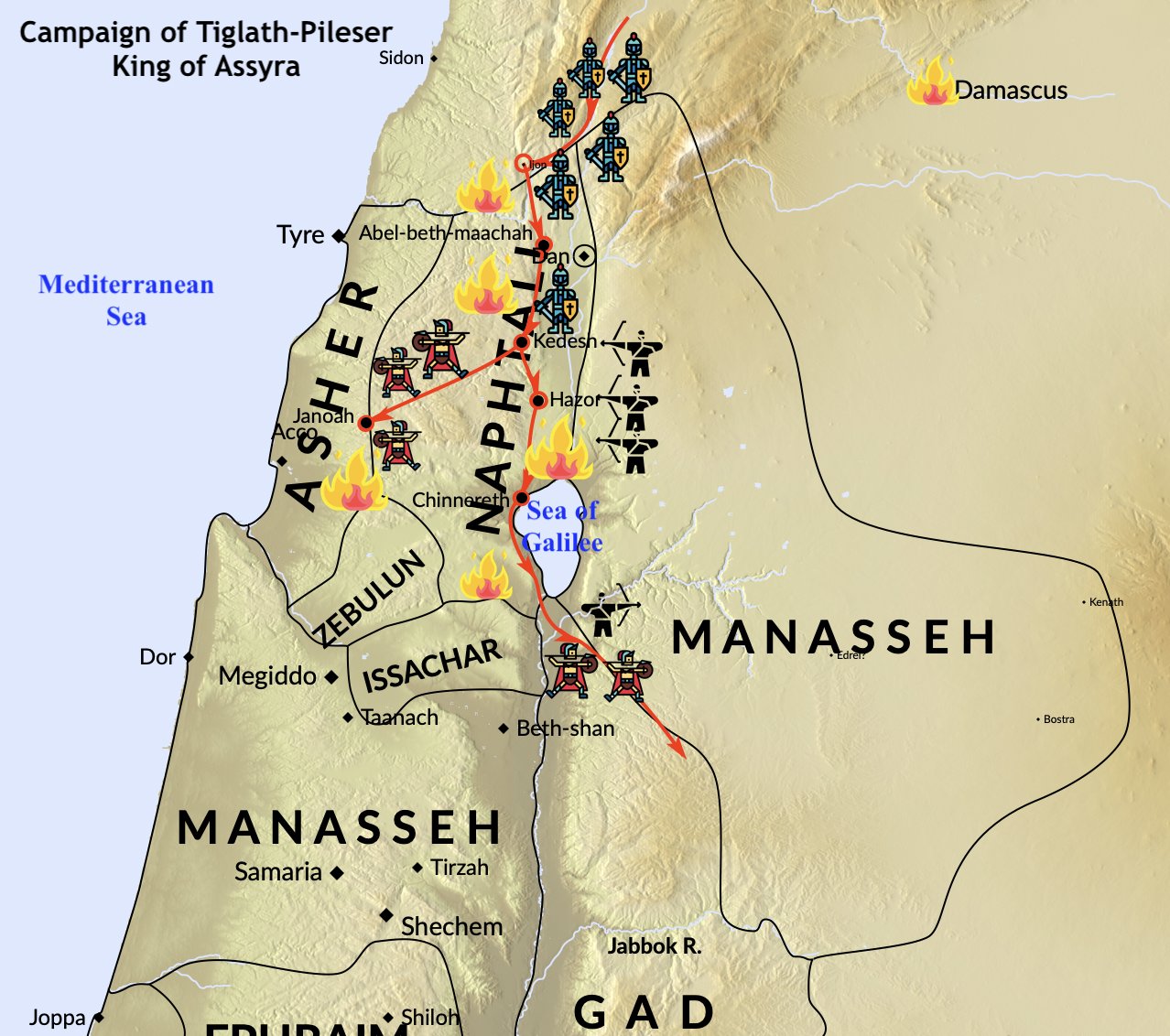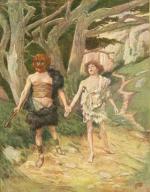- Biblical Maps
- Home Page
- History of Israel Blog
- Ancient Mesopotamia
- Map of Palestine
- Abraham
- Ancient Israel
- 12 Tribes of Israel
- Jerusalem
- The Book of Isaiah
- Palestine
- The Habiru
- Contact Us
- Bible Study Forums
- Media Page
- Visitors Sitemap
- Privacy Policy
- The History of the Old Testament
- In the Days of Noah
- The City of Jericho
VISIT OUR FACEBOOK PAGE!
Gad - son of Jacob
The tribe of Gad is mentioned in connection with tenacity by both Jacob & Moses.
Jacob's Blessing- Genesis 49:19
"...will be attacked by a band of raiders, but he will attack them at their heels."
Moses' Blessing - Deuteronomy 33:20-21
"...Blessed is he who enlarges Gad's domain! He lives there like a lion, tearing at arm or head. He chose the best land for himself; the leader's portion was kept for him. when the heads of the people assembled, he carried out the Lord's righteous will, and his judgments concerning Israel."
PAGE CONTENTS
Jacob's Blessing
Gad - the 7th Son of Jacob
Gad Encampment
Gad & Joseph
Gad in Exile
Gad - the 7th Son of Jacob
Gad was the seventh son of Jacob, bore to Zilpah, Leah's handmaiden. Scripture records that Leah had stopped giving birth, after birthing the first four sons of Jacob. Rachel, becoming jealous, had struggled with God and Leah about this, as recorded in Genesis 30:6. Rachel gave her handmaiden Bilhah to Jacob, and he conceived two sons with her.
This made Leah jealous, naturally. Leah's actions are recorded in Genesis 30:9-10.
"When Leah saw that she had stopped bearing, she took her maid Zilpah and gave her to Jacob as a wife. And Leah's maid Zilpah bore Jacob a second son."
This son was Gad, and his birth is recorded in Genesis 30:10-11.
"And Leah's maid Zilpah bore Jacob a son. Then Leah said, 'How fortunate!' So she named him Gad."This made Leah jealous, naturally. Leah's actions are recorded in Genesis 30:9-10.
"When Leah saw that she had stopped bearing, she took her maid Zilpah and gave her to Jacob as a wife. And Leah's maid Zilpah bore Jacob a second son."
This son was Gad, and his birth is recorded in Genesis 30:10-11.
"And Leah's maid Zilpah bore Jacob a son. Then Leah said, 'How fortunate!' So she named him Gad."
The meaning of the name has been interpreted in two ways. The King James Version gives the following meaning in Genesis 30:11.
"And Leah said, A troop cometh: and she called his name Gad."
The King James, thus, interprets the meaning "troop", or, "a troop is coming". However, the New American Standard Bible, and the New International Version, have different interpretations. The NASB reads as following in the same verse.
"Then Leah said, 'How fortunate!' So she named him Gad."
The NIV is similar in its' interpretation.
"Then Leah said, 'What good fortune!' So she named him Gad."
The meaning in both the NASB and NIV is "fortune", or "fortunate". However, in the KJV Gad is translated as "troop", or, "a troop is coming". The NIV adds a footnote to the verse which states; "Gad can mean good fortune or a troop.
Henry Morris, in his book The Genesis Record, states that the name is associated with a pagan god of luck. The association is with a North Arabian deity of fortune. This god is part of the Phoenician and Syrian pantheon. However, in this instance Leah seems to be using the name as a means to express her good fortune of having another son.
The confusion of the name rests in the fact it also comes from the Hebrew word guwd. This word translates as: "to crowd upon, "attack", invade, overcome.
The tribe would indeed become fierce warriors, as stated above. However, it is unlikely Leah had this in mind upon the birth of her son. Thus, it would seem, perhaps, Leah had intended to express her good fortune from God with the birth of Gad, thus she named him something to express her happiness and good luck.
This, of course, is speculation. However, it would be consistent with the feeling parents have upon the birth of a child. Leah had no way of knowing at the time, short of God revealing to her (which Scripture never records), that this son would become a tribe of warriors. Thus she named him in order to express her joy or "fortune".
This son is silent throughout the narratives in <b>Genesis</b> covering the actions of Jacob's sons. His absence in the Joseph narrative is an indictment he went along with the original plan to kill his brother Joseph. Later, upon the urging of Reuben, the brothers changed their minds, and sold him to slavery, rather than kill him. Gad seemingly went along with his brothers plans.
TRIBAL ENCAMPMENT
The Israelites left Egypt in haste. Moses had warned them the night before to be ready to depart at once. Thus, as they set out, preparations seem to have been made in haste. Very little time was given to the organization of the Israelites, and how and when they were to leave, and in what order, or structure, their migration would take. Exodus 12:33-34 records the departure of Israel from Egypt.
"And the Egyptians urged the people, to send them out of the land in haste, for they said, 'We shall all be dead.' So the people took their dough before it was leavened, with their kneading bowls bound up in the clothes on their shoulders."
God, however, was not to leave His people wandering in the desert with no direction, no structure, no hierarchy for solving disputes and issues. God would lay the foundation for the future self-government, and the unification of the 12 tribes of Israel upon settling Canaan.
He gave Moses strict and explicit instructions on how the Israelites were to set up camp, where each tribe was to camp around the Tabernacle, and the order they were to break camp upon leaving a location. These instructions are found in Numbers 2.
The 12 tribes of Israel were divided into four camps, with each camp consisting of 3 tribes. One tribe was assigned the leadership of the camp, and was responsible for overseeing the functions of their particular camp. As Israel set up camp in the wilderness, these four camps would encamp on the north, south, east, and west of the Tabernacle. Moses, Aaron, and the Levites encamped within the Tabernacle compound itself, with the other tribes surrounding the Tabernacle.
Moses instructed the tribe of Gad they were to be included within
the camp of Reuben. This meant the tribe of Reuben would be the
leading tribe, responsible for overseeing the other tribes within their
camp. Their orders are given in Numbers 2:14-15.
"Then comes the tribe of Gad, and the leader of the sons of Gad: Eliasaph the son of Deuel, and his army, even their numbered men, 45,650."
They encamped on the southern side of the Tabernacle. As the tribes set up camp, Reuben would set up first, then came the tribe of Simeon, and lastly the Gadites set up camp beside Simeon. This army numbered a total of 151,450 fighting men. Of the four camps, this was the third largest camp of fighting men.
As the Israelites broke camp, the camp of Reuben would break camp second. The camp under the leadership of Judah broke camp first. Once Judah and company broke camp, next came the camp of Reuben. Though Scripture does not state the order of marching within the camp of Reuben, it would seem logical they would break camp in the order they set camp.
Numbers 1:14 lists the leader of the army of Gad, as stated above. This man is said to have been Eliasaph, son of Deuel. This man would have been their commander, the one responsible for alerting the tribe when to pitch camp, and break camp. He would have led the army in battle. Later in the book of Numbers, Eliasaph presents the tribal offering.
God hand picked these men, and gave their names to Moses. These men, according to the word of the Lord to Moses, "are the names of the men who shall stand with you". These men were surely Godly men, righteous men, concerned with the commandments of God. It would seem God would choose some of the most faithful men within each tribe to be leader. Thus, God had begun the transformation of a loose band of desert migrants, to what would become a powerful and influential kingdom.
GAD & JOSEPH
Gad, along with the other brothers of Zilpah and Bilhah, may have been involved in a negative incident in Genesis 37. This passage, however, is very vague and few details are given. The involvement of Gad is gleamed from contextual evidence. The evidence is found in verse 2.
"This is the account of Jacob. Joseph, a young man of seventeen, was tending the flocks with his brothers, the sons of Bilhah and the sons of Zilpah, his father's wives, and he brought their father a bad report about them.'.
Scripture plainly states that Joseph was tending the flocks with "the sons of Bilhah and the sons of Zilpah". This would have included Dan, Naphtali, Gad and Asher. The remaining brothers from Leah and Rachel, Reuben, Simeon, Levi, Judah, Issachar and Zebulun, by implication, seem to be absent. Benjamin had not yet been born.
Joseph is recorded as reporting back to Jacob a negative report about his brothers. What this report was is not told. Whatever the brothers were guilty of, they clearly did not intend for it to get back to Jacob.
Gad, by implication, would have been involved in this incident. He would have naturally built up resentment and bitterness towards Jospeh for his bad report. Nobody, after all, likes a tattle-tale. Joseph, however, felt impelled to tell his father. This may indicate some serious infraction or transgression on the part of his brothers.
This incident would have provided the motive for to rid themselves of their younger half-brother. As the narrative unfolds, Judah and Reuben emerge as the main characters, for they are the only two Scripture mentions. The others, apparently, went along with the plot, probably willingly. After all, Joseph had told on all of them to Jacob, which surely must have brought the wrath of Jacob down on his wayward sons.
Genesis 42 mentions another incident in which Gad would have been involved, though not mentioned specifically. A famine had come down hard on Canaan. The residents of Canaan were going to Egypt in order to purchase grain from the royal granaries. Jacob, seemingly, had held out for as long as possible. However, the trip to Egypt was inevitable, as seen in verse 1.
"When Jacob learned there was grain in Egypt, he said to his sons, 'Why do you just keep looking at each other?' He continued, 'I have heard that there is grain in Egypt. Go down there and buy some for us, so that we may live and not die. Then ten of Jospeh's brothers went down to buy grain from Egypt...so Israel's sons were among those who went to buy grain, for the famine was in the land of Canaan.'
Gad accompanied his other brothers on the trip to Egypt. He would have been present when they encountered Joseph in Egypt. Only Benjamin was left behind, though Joseph would summon for him to be brought to Egypt in testing the character of his brothers.
Further insight is given in Genesis 46. This chapter is describing those that went to Egypt with Jacob. His party is numbered at seventy. Each son is listed, as well as the families of that particular son. Those accompanying Gad to Egypt are listed in Gen. 46:16.
"The sons of Gad: Zephon, Haggi, Shuni, Ezbon, Eri, Arodi and Areli."
Only Benjamin had more sons with nine. Further description concerning Gad and his family is given in Numbers 26:15-18. This passage lists the clans through each of his seven sons. Through Zephon came the Zephonite clan, Haggi produced the Haggite clan, Shuni the shunite clan, Ozni (Ezbon) the Oznite clan, Eri the Erite clan, Arodi the Arodite clan, and Areli the Arelite clan. All together, the clan of Gad consisted of 40,500 people. Gad, as the father of the family, stood at the head of the house.
Numbers 1 opens up with the first census Moses was instructed to take of the Israelites. The tribe of Gad, according to verses 24-25, possessed 45,650 men. This number, however, did not include all the members of the tribe. The census was taken to gather the number of men "twenty years old or more who were able to serve in the army".
In this passage, as previously stated, Eliasaph was chosen as the leader of the tribe. These men, according to verse 5, were to "assist" Moses. The Scripture does not list specific areas they were to assist in. The presumption is that these men helped Moses in any way he needed.
In Numbers 13 Moses is instructed to appoint spies from among the tribes to search out the land of Canaan. From this tribe, Geuel, the son of Maki, was chosen. Again, though the tribe is not mentioned specifically, they exhibit a lack of obedience to God. Geuel was one of the spies which reported the inhabitants of the land were too powerful, and the cities too big for Israel to conquer.
The Bible records only Joshua and Caleb remained faithful in their reports to Moses. As discussed above, Caleb was rewarded the land which would become Judah for his faithfulness. Joshua ascended to the leadership of all Israel. The other spies, however, turned the hearts of the Israelites to fear and anger. They even threatened to stone Caleb and Joshua. Moses, once again, interceded on behalf of the people, as God sought to destroy them.
The next appearance of this tribe occurs with their conquest of
Sihon and Og (see above). Though guilty of transgression in certain
passages, these men proved faithful and seem to have redeemed themselves
in the eyes of Moses throughout the battles east of the Jordan and the
remainder of the Conquest west of the Jordan.
After their successful campaigns east of the Jordan, the Transjordanian tribes joined the remaining Israelites in the conquest west of the Jordan. A passage from Deuteronomy 3:18 states how these three tribes were to not only fight with their brethren, but be the lead tribes in the upcoming battle.
"I commanded you at that time: 'The Lord your God has given you this land to take possession of it. But all your able-bodied men, armed for battle, must cross over ahead of your brother Israelites."
Moses goes on to state that the women, children and livestock of Gad may stay behind and occupy the towns and villages. Once the Conquest was complete, then the men may return as well. The implication of this verse is that the Transjordan tribes were the lead tribes in the battle of Jericho. They were also to play key roles in the future battles against the Canaanites. Jericho, however, loomed on the horizon.
Scripture makes it plain the Transjordan tribes led the nation
across the Jordan. Naturally, it would not be too presumptuous to state
they were the lead tribes during the war. When they crossed, they were
ready to fight. The Bible explicitly stated they were armed for war. If
this were the case, then they would have been part of what formed the "armed guard" in Joshua 6:9.
The armed guard was to march ahead of the seven priests blowing trumpets of rams' horns. These seven priests marched in front of the Ark of the Covenant. Behind them marched the rear guard.
This would have been a tremendous honor for the Transjordan tribes. However, it was also the fulfillment of their obligation to God. This was an act of obedience and faithfulness on their part. It was no easy obligation.
To the tribesmen, as well as the rest of the Israelites, Jericho seemed an impenetrable fortress. Though the archaeology of Jericho is another hotly debated topic, it has been proven the walls of Jericho were indeed massive. One of the controversies of Jericho involves the time period of when these walls date. Many scholars say they pre-date Joshua's invasion of Jericho. Such evidence often rests soley on dating techniques, which are, at best, debatable.
Regardless, the Transjordan tribes would have been the first tribes to encounter the walls of Jericho up close and personal. As Scripture records, the battle of Jericho was a thorough victory for the Israelites. They destroyed the city, and everything in it, as well as all of the occupants, save Rahab the harlot.
It is likely at least a part of the tribe was involved in the second battle for Ai, which followed the battle of Jericho. Israel had been routed in the first battle due to the sin of Achan (Josh. 7-8). After repenting, and stoning Achan to death, the Israelites prepared for a second advance.
"...He chose thirty-thousand of his best fighting men and sent them out at night with these orders: 'Listen carefully. You are to set an ambush behind the city. Don't go very far from it. All of you be on the alert."
If one heeds the words of Moses in his blessing, and the evidence gathered from certain passages, it would not be too presumptuous to assume certain men from the tribe may have been a part of this night party, which set an ambush for the men of Ai. Joshua lured the men of Ai from the city with a smaller force. Once Ai was vacated, the hidden force of Israelites surged upon the city, taking it easily and setting it on fire (Josh. 8).
Scripture does not state their role in the battle of Ai. Yet, their importance in other battles leading up to this point is almost certain. They were fierce and competent warriors. Their roles in the early conquest were extremely vital, and opened the door for the occupation of the land by their brethren.
GAD in EXILE
Not only was Gad involved in disputes with desert nomads, but the tribes of the Transjordan found themselves in constant battles with the major powers of the time. The first encounter with a major power and Gad is listed in II Kings 10:32-33. The time frame involved is during the reign of Jehu, king of Israel. He reigned from 845-818 BC.
In 841 BC, Hazael king of Aram-Damascus waged war against the
northern kingdom of Israel. Scripture equates this war with divine
judgment from God in verse 32.
"In those days the Lord began to reduce the size of Israel. Hazael overpowered the Israelites throughout their territory east of the Jordan in all the land of Gilead (the region of Gad, Reuben and Manasseh), from Aroer by the Arnon Gorge through Gilead to Bashan."
The tribe of Gad, thus, fell under the hand of king Hazael. One must remember that Jeroboam I set up golden calves in Bethel and Dan. These idols were to rival the one true Temple in Jerusalem. God, obviously, was not happy with Jeroboam and the northern kingdoms worship of these idols.
The foreign invaders of Gad and company, thus, were divine instruments of God to punish the north. Hazael vanquished the Israelites in the east, and took over the land of Gad, Reuben and Manasseh for his kingdom. The northern kingdom of Israel, in effect, lost all of its possessions east of the Jordan.
Eventually Gad regained their land, as recorded in II Kings 13:24. Upon the death of Hazael, his son Ben-Hadad rose to the throne of Aram. Joash ascended to the throne of Israel upon the death of his father, Jehoahaz. Thus, during the reign of Joash (802-787 BC), Israel regained all of its territory in the Transjordan. Ben-hadad was defeated, and the land of Gad, though briefly, returned to its rightful owners.
The final blow to the tribe of Gad, as well as the other tribes of the northern kingdom, was to be delivered by the Assyrians. The incident is recorded in II Kings 15:29.
"In the time of Pekah king of Israel, Tiglath-Pileser king of Assyria came and took Ijon, Abel Beth Maacah, Janoah, Kedesh and Hazor. He took Gilead and Galilee, including all the land of Naphtali, and deported the people to Assyria."
The end of the northern kingdom was in sight. The tribe of Gad, once again, lost their land. This time, however, the Assyrians deported the residents of the land back to Assyria. This took place during the reign of Pekah, spanning from 735-732 BC. The invasion of Tiglath-pileser III took place around 734 BC.
However, the Assyrians would continue their war with Israel under Shalmaneser V (727-722 BC) and under Sargon II (725-705 BC). It was under Sargon II that the destruction and deportation of the northern tribes was completed. Most scholars agree that by 720 BC, the northern kingdom of Israel was no more.
The Transjordan tribes joined their northern compatriots in exile. These tribes became the 10 Lost Tribes of Israel. They were dispersed, placed in various towns in Assyria, and their land was re-populated by foreigners.
The valor and might displayed by Gad over the course of its history faded into the annals of Jewish lore and history.
Conclusions
All is not lost for the tribe of Gad, however. The prophet Jeremiah spoke concerning Gad and Ammon. His prophecy is found in Jeremiah 49:1
"Concerning the Ammonites: 'This is what the Lord says: Has Israel no sons? Has she no heirs? Why then has Molech taken possession of Gad? Why do his people live in its towns? But the days are coming,' declares the Lord, 'When I will sound the battle cry against Rabbah of the Ammonites; it will become a mound of ruins, and its surrounding villages will be set on fire. Then Israel will drive out those who drove her out,' says the Lord."
God has not forgotten the tribe of Gad or the other nine tribes of Israel. The day will come when they resettle their lands, and drive out those that drove them out.
It was the sin of Gad and the northern tribes of Israel which brought about their ultimate demise and exile. However, it will be the faithfulness of God that restores Gad and Israel in His future kingdom.
Other Sources for the Tribe of Gad:
The Tribe of Gad - Jewish Virtual Library
Back to the top of Gad
Back to the Home Page
Back to the 12 Tribes of Israel
Recent Articles
-
The History of Ancient Israel
Dec 25, 23 02:16 PM
An easy to read history of ancient Israel from Old Testament times to today. -
The Ancient City of Jericho
Dec 18, 23 11:21 PM
The city of Jericho is one of the most ancient cities on earth. The city played a crucial role in a number of Bible stories. -
Story of Cain and Abel
Dec 17, 23 01:20 PM
The story of Cain and Abel is a tragic story of jealousy, rage and fratricide. It is the first murder in recorded history.
SAMUEL the SEER
Now Available in Print & eBook on Amazon!!
POPULAR TOPICS
Learn more about these popular topics below. The Bible is full of fascinating stories, characters and mysteries!
BIBLE MAPS
Explore the land of the Old Testament! View these maps of the Bible.
